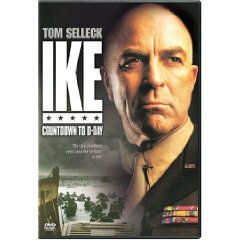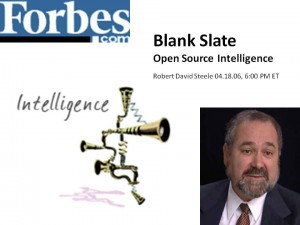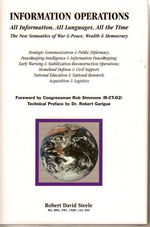The arrogance and naiveté of the National Security Council and its principal protagonists is ably reflected in the title. The pretentiousness and unreality of “Running the World” is fittingly complemented by a cover photo of a Cabinet meeting, not an NSC meeting-the latter take place in crummy little rooms with poor ventilation, not at all the kind of image one wants as an Emperor, naked or not.
There are three consistent and very useful themes throughout the book that make it extraordinarily valuable to any student of the pathologies of the national security “decision” process (I use that term *very* loosely).
First, that each Administration allows personal ambitions and an almost pathological desire for “differentiation” from the previous Administration to first destroy and then slowly rebuilt the NSC. Hence, it is dysfunctional much of the time, regardless of the ideology prevailing at the time.
The second prevailing theme, one that Amy Zegart captured so well in her seminal scholarly work, “Flawed by Design,” is the perpetual dysfunctionality, a constant dysfunctionality, between the Departments of State and Defense, and between Defense and the loosely managed U.S. Intelligence Community. The bottom line is that personalities and politics, not intelligence nor wisdom, are the prevailing drivers of U.S. national security.
Lastly, the irrelevance of secret intelligence to the White House decision process, regardless of what Administration is in power, is documented. Page 361 is an especially good indictment of the Central Intelligence Agency (CIA) in particular, and with specific reference to its complete incompetence at economic intelligence needed by the Department of the Treasury. In general, intelligence in this book is portrayed, accurately, as either irrelevant or a pawn to the politically-driven preferences of the White House.
This is not a scholarly work, but merits great credit for the many interviews. Over-all the author has leveraged close access to a large variety of U.S.players over time, while not engaging the other players, including foreign players, private sector players, and non-governmental players. The book, even with its focus only on US players would have benefited from an annex charting and comparing the approaches of various NSC iterations to various issues and topics, to include number of action officers, number of meetings, and number of decision papers, but that kind of hard work does not appear to have been part of the plan. There is also little mention of the role lobbying and blatant corruption play in making foreign and security policy–for example, there is no mention of how the White House and the U.S. Senate, from 1974-1979, knew full well that Peak Oil (the end of cheap oil) had arrived, but in what may well be the most treasonous and retrospectively impeachable offence against the public interest, both the White House and the Senators decided to “live the dream” and waste 25 years during which we could have achieved energy independence and sanity.
The book, by virtue of its focus on primary research, does not address the substantive literature on global issues, nor the scholarly and practical literature on the NSC. Morton Halperin's seminal work on “Bureaucratic Politics and Foreign Policy” and other works on the NSC such as those edited by Dr. Loch Johnson, the foremost academic observer of secrecy and policy, are essential complements to this author's offering.
The book whitewashes Tony Lake, whose incapacity as an advisor merits note. Most of what the author puts forward about Lake is contradicted by other accounts including those of Dick Clarke, who says he could not get Lake's support until the time came for the latter to leave government and write a book. Naturally there are different points of view.
The book is a hatchet job on the Reagan era, even catty in its tone, but the author avoids appearing to be a sycophant to Bush II in that he very properly documents the grotesque dysfunctionality of the Bush II team (and the extraordinary competence of Vice President Cheney in getting his way as co-President). The author has done a good job of leading up to a severe indictment of the Bush II national security decision process, and excels at showing how Condi Rice was “run over” and side-lined by Cheney, Rumsfeld, and the neo-conservatives. His documentation on Cheney as a de facto prime minister is quite good, and these few pages are alone worth the price of the book. Pages 428-429 are “hot” and make it clear that the Bush II Administration, where Cheney was given the terrorism mandate in passing (something not widely known to the public), chose to emphasize invading Iraq, national missile defense, and energy sweetheart deals over counter-terrorism during the critical three months leading to 9-11.
There are a few disconcerting errors or failures in the book. In lambasting Reagan for invading Grenada, he says that 8,612 medals were handed out. Had he troubled to check with the military, he might have learned the difference between medals and campaign ribbons. He seriously over-sells both Burger and Lake while ignoring the blatant manner in which the Clinton Administration, and Madeline Albright in particular, sought to down-play terrorism to the point of suppressing alarmist reporting and ignoring or side-lining Dick Clarke. He claims, on page 387, that the Clinton Administration “foiled plots against trans-Pacific jumbo jet traffic.” Not so fast. The terrorist blew himself up in the Philippines prior to executing the plot, which was completely undetected by U.S. intelligence, and it was that error that revealed the plot when Philippine authorities responded to the resulting fire. On page 457 he makes the observation that the Congress has less turnover than the Soviet politburo. This should have been credited to Peggy Noonan and Ronald Reagan, who used it in an address to a joint session of Congress. He ends the book wisely, saying, “The ultimate check is an educated American public,” which thought tallies nicely with Thomas Jefferson, who said “A Nation's best defense is an educated citizenry.”
This is a book that needed to be written. It documents the pathetic manner in which U.S. national security is in the hands of a small group of people that place loyalty to one another above intelligence, wisdom, and strategic thinking. We all suffer. It is a primary reference for all who would wish to understand why the greatest Nation on the planet has such a pathetic lack of strategic culture, vision, process, and outcome.
The Exective, and the Congress, and Broken. Here are some other books, with my reviews:
Vice: Dick Cheney and the Hijacking of the American Presidency
The One Percent Doctrine: Deep Inside America's Pursuit of Its Enemies Since 9/11
State of War: The Secret History of the CIA and the Bush Administration
A Pretext for War: 9/11, Iraq, and the Abuse of America's Intelligence Agencies
Weapons of Mass Deception: The Uses of Propaganda in Bush's War on Iraq
Running on Empty: How the Democratic and Republican Parties Are Bankrupting Our Future and What Americans Can Do About It
The Broken Branch: How Congress Is Failing America and How to Get It Back on Track (Institutions of American Democracy)
Breach of Trust: How Washington Turns Outsiders Into Insiders
The Battle for the Soul of Capitalism












